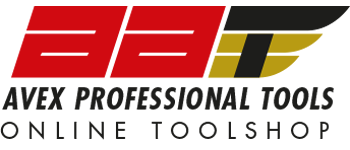Tool Safety 101: Protecting Yourself on the Job
Avex Tool Shop on 31st Jan 2024
When it comes to working with tools, safety should always be your top priority. Whether you're a professional tradesperson or a DIY enthusiast, using tools responsibly can prevent accidents and injuries. It's essential to recognize that the proper handling of tools not only safeguards you but also ensures the longevity of your tools and the quality of your work.
In this article, we will delve into various safety measures and guidelines that will equip you with the knowledge and skills needed to make your workspace a secure and productive environment.
Know Your Tools
The first step in ensuring tool safety is to know your tools inside and out. Each tool has its features, functions, and potential hazards. Before using any tool, read the manufacturer's instructions and familiarize yourself with its proper usage. Understanding the tool's limitations and capabilities will help you avoid accidents and maximize its effectiveness.
Inspect and Maintain Your Tools
Regular tool maintenance is key to ensuring safety. Before each use, inspect your tools for any signs of wear, damage, or malfunction. Loose parts, frayed cords, and dull blades are all potential hazards that should be addressed immediately. It is also important to keep your tools clean and well-lubricated to prolong their lifespan and maintain efficiency.
Wear Appropriate Safety Gear
Protecting yourself with the right safety gear is non-negotiable. Depending on the type of work you do, this gear may include:
Safety goggles: Protect your eyes from flying debris, dust, and chemical splashes.
Ear protection: Guard against hearing damage caused by loud tools or equipment.
Respirator mask: Shield your lungs from harmful dust, fumes, or vapors.
Gloves: Prevent cuts, blisters, and burns while maintaining a firm grip.
Steel-toed boots: Keep your feet safe from falling objects or heavy equipment.
Hard hat: Protect your head from overhead hazards.
Always wear the appropriate safety gear for the task at hand, and make sure it fits properly, as ill-fitting gear can be just as dangerous as not wearing any at all!
Create a Safe Work Environment
In addition to personal protective gear, create a safe work environment. This means keeping your workspace clean and organized. Clutter and debris can increase the risk of accidents and injuries. Ensure good lighting so you can see your work clearly and avoid potential hazards, and also be aware of your surroundings and the people around you to prevent accidents caused by collisions or distractions.
Use Tools as Intended
Tools are designed for specific tasks and using them for anything other than their intended purpose can lead to accidents. Avoid improvising or making makeshift modifications to your tools. Use the right tool for the job and follow the manufacturer's guidelines. If you're unsure about the proper tool to use, seek advice or training before proceeding.
Keep Your Focus
Distractions can be dangerous when working with tools. Stay focused on the task at hand and avoid any activities or conversations that could divert your attention. Accidents often happen when concentration wanes, so make sure you're fully engaged in your work.
Practice Safe Handling
Always keep your hands away from moving parts. This includes keeping your fingers clear of blades, bits, and other rotating components. It is also important not to carry tools by the cord as this can lead to fraying or damage. Secure workpieces properly by using clamps or vices to hold materials in place, so you don't have to use your hands to stabilize them. Remember to keep your tools sharp as dull tools require more force and are more likely to slip and cause accidents.
Store Tools Safely
Proper tool storage is essential for safety, and when they are not in use they should be stored in a dry, cool place away from children and unauthorized users. Use toolboxes, racks, or wall-mounted storage solutions to keep your workspace organized and your tools easily accessible.
Educate Yourself
Continuous learning is essential for tool safety. Stay updated on best practices, safety guidelines, and any changes in tool technology or design. Attend workshops, take courses, or seek guidance from experienced professionals to enhance your knowledge and skills.
Be Prepared for Emergencies
Despite your best efforts, accidents can still happen. It's crucial to be prepared for emergencies. Have a first aid kit nearby, know the location of fire extinguishers, and have an emergency plan in place. Ensure you have access to a phone or any other communication device to call for help if needed.
Avex Tool Shop is an online tool shop that offers a comprehensive range of industrial and engineering tools to manufacturing, repair, and service companies, artisans, mechanics, tradespeople, hobbyists, resellers, and distributors. Whatever your needs are, Avex has the solution for you. Visit our store today, or our online shop, for the best deals, and best quality, that money can buy.


